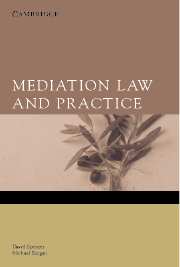Book contents
- Frontmatter
- Contents
- Acknowledgements
- Preface
- List of tables and figures
- Table of statutes
- Table of cases
- PART I THE PRACTICE OF MEDIATION
- PART II THE LAW OF MEDIATION
- 8 Mandatory Mediation
- 9 Confidentiality
- 10 Settlement Agreements
- 11 State Sponsored Mediation
- 12 Mediation Clauses in Contracts
- 13 Liability in Mediation
- 14 The Future of Mediation
- Bibliography
- Index
10 - Settlement Agreements
Published online by Cambridge University Press: 05 June 2012
- Frontmatter
- Contents
- Acknowledgements
- Preface
- List of tables and figures
- Table of statutes
- Table of cases
- PART I THE PRACTICE OF MEDIATION
- PART II THE LAW OF MEDIATION
- 8 Mandatory Mediation
- 9 Confidentiality
- 10 Settlement Agreements
- 11 State Sponsored Mediation
- 12 Mediation Clauses in Contracts
- 13 Liability in Mediation
- 14 The Future of Mediation
- Bibliography
- Index
Summary
Introduction
Settlement agreements arrived at through mediation are contracts that bind parties just like any other contract. The confidential nature of events leading up to those agreements has been discussed in the previous chapter, as has the concept that once agreement is reached and embodied in a written document then should a party challenge the validity of that document it may be adduced as evidence along with evidence disclosing the circumstances that led up to its creation. In other words the veil of confidentiality is lifted once a party chooses to challenge a settlement agreement and evidence may be adduced of factors leading to its formation in order to assist the court in deciding the validity of such agreements.
Somehow it seems absurd that a document that is the symbol of resolution between disputing parties can itself be the cause of a further dispute between them. However, such is the nature of the law that seeks to protect innocent parties from those who would take advantage of them. If courts were not allowed to adduce evidence going to the formation of a mediated settlement agreement then a party would be able to induce the other party into agreeing to settle based on, for example, misrepresentation or misleading and deceptive conduct and effectively get away with inducing the other party into an unconscionably arrived at agreement protected by the veil of confidentiality.
- Type
- Chapter
- Information
- Mediation Law and Practice , pp. 346 - 376Publisher: Cambridge University PressPrint publication year: 2007



